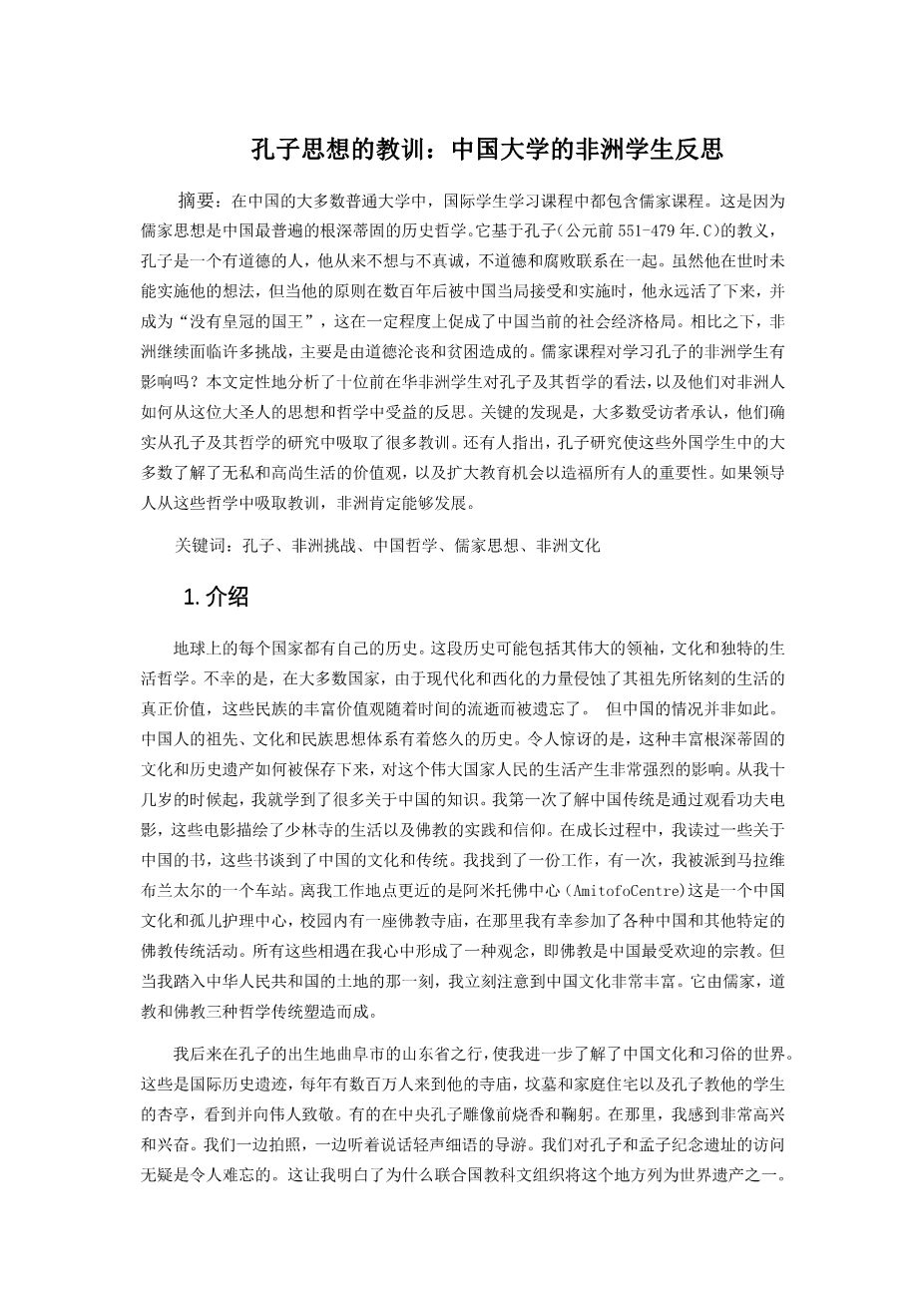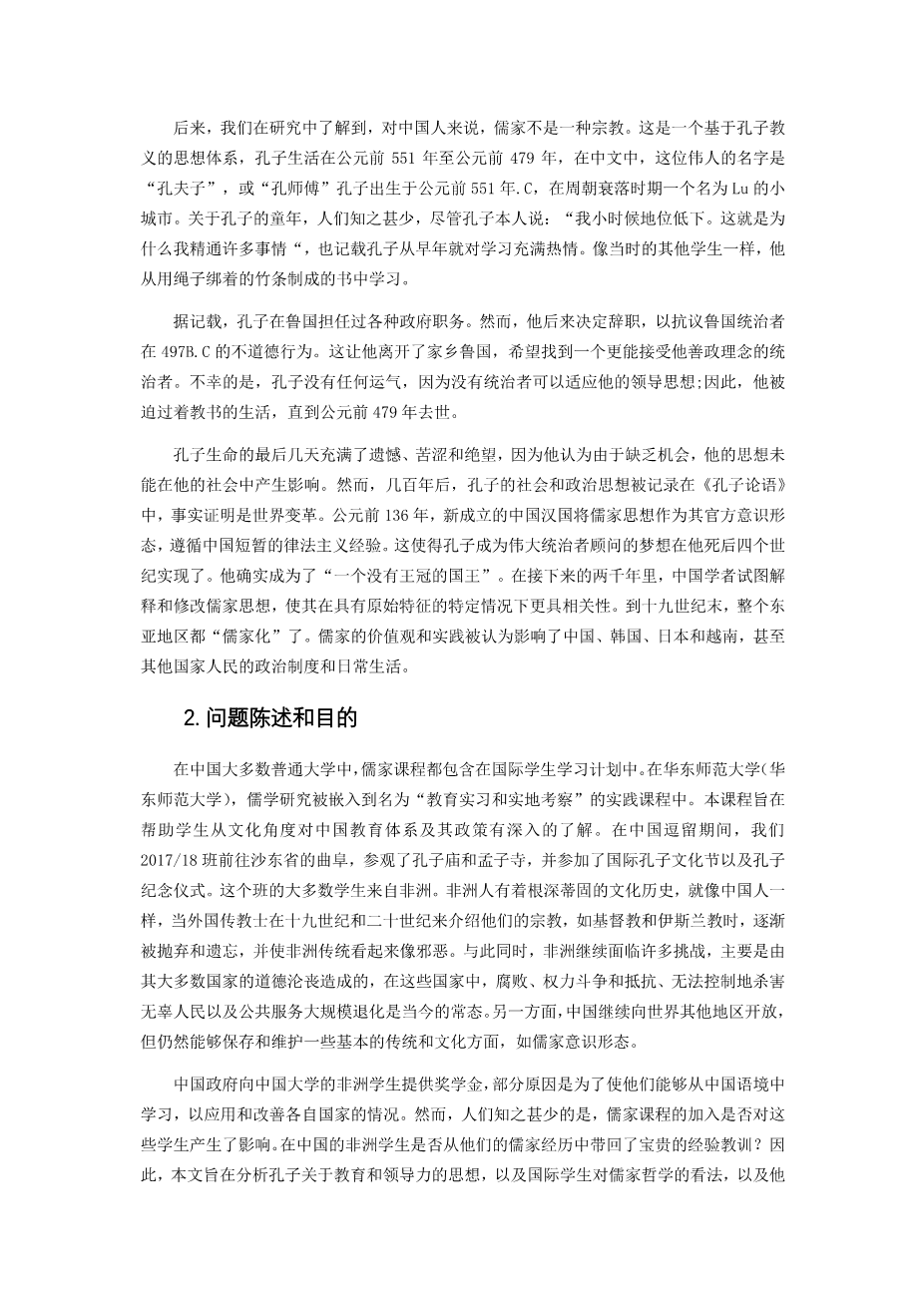Lessons from Confucius Ideas: Chinese
Universitiesrsquo; African Students Reflections
Samson Chaima Robin Kajawo
Abstract
In most normal universities in China, Confucian lessons are included in the international students study programs. This is because Confucianism is the most prevalent deep rooted historical philosophy in China. It is based on the teachings of Confucius (551 - 479 B.C.), a virtuous man who never wanted to be associated with insincerity, immorality and corruption. Though he failed to implement his ideas when he was alive, he lived forever and became “a king without a crown” when his principles were accepted and implemented by Chinese authorities many hundred years later, which has partly contributed to the current socio-economic landscape of China. In contrast, Africa continues to face a lot of challenges chiefly caused by moral degradation and poverty. Do Confucian lessons have an impact on the African students who study them? This paper qualitatively analyzed the views of ten former African students in China regarding Confucius and his philosophies and their reflections on how Africans can benefit from the ideas and philosophies of this Great Sage. The key finding was that the majority of respondents acknowledged that they indeed took home a lot of lessons from their studies regarding Confucius and his philosophies. It was also noted that Confucius studies made the majority of these foreign students to understand the values of selflessness and virtuous life in leadership as well as the importance of expanding access of education for the benefit of all people. Africa can surely develop if leaders tap lessons from these kinds of philosophies.
Keywords
Confucius, African Challenges, Chinese Philosophy, Confucianism, African Culture
Introduction
Each country on earth has its own history. This history could include its great leaders, culture and unique philosophies of life. Unfortunately, in most countries, those rich values of the nations have been forgotten in the passing of time due to the forces of modernization and westernization which have eroded the true value of living as inscribed by their forefathers [1] [2] [3]. But this is not the case with China. Chinese people have a very long history of their ancestors, culture and national ideological systems. It is amazing how this rich deep rooted cultural and historical heritage has been preserved to have a very strong effect on the lives of the people of this great nation up to now. From my teen days, I had learned a lot about China. I first learned about Chinese traditions through watching Kungfu movies that depicted life at Shaolin temples and Buddhist practices and beliefs. Growing up, I read books about China that talked about its culture and traditions. I got a job that got me posted, at one time, to a station in Blantyre, Malawi. Nearer to my workplace was the Amitofo Centre, a Chinese cultural and orphan care centre which had a Buddhist Temple inside the campus, where I was privileged to attend to various Chinese and other specific Buddhist traditional events. All these encounters formed a perception in me that Buddhism was the most popular religion in China. But the moment I stepped my foot in the land of the Peoplersquo;s Republic of China, I immediately noticed that the Chinese culture was very rich. It is molded by three philosophical traditions, Confucianism, Taoism, and Buddhism.
My trip to Shandong province in the City of Qufu, Confuciusrsquo; birthplace later opened my eyes further to the world of Chinese culture and customs. These are the international historical sites where millions of people come each year to see and pay tribute to the Great Man at His temple, grave and family home, and also at the Apricot Pavilion where Confucius taught his students. Some burn incense and bow before the central statue of Confucius. Being there in fresh, I was very happy and excited. We took pictures while listening to the soft speaking tour-guide. Our visit to Confucius and Mencius memorial sites was undeniably a memorable one. It made me understand why UNESCO made this place one of the World Heritage Sites.
In our studies, we later learned that to the Chinese, Confucianism is not a religion. It is a system of thought based on the teachings of Confucius, who lived from 551 to 479 B.C. [4]. In Chinese language, this Great Manrsquo;s name was “Kong Fuzi”, or “Master Kung” [5]. Confucius was born in 551 B.C. in a small city called Lu during the period in which the Zhou dynasty was in decline [1]. Little is reliably known about Confuciusrsquo; childhood, though Confucius himself remarked: “I was of lowly status when I was young. That is why I am skilled in many things” [6]. It is also recorded that from his earliest years, Confucius had a passion for study. Like other students of the time, he learned from books made of strips of bamboo bound by cords [7].
It is recorded that Confucius held various government positions in the state of Lu [8]. However, he lateron decided to resign from his post in protest of the immoral conduct of the Lu ruler in 497 B.C. This made him leave his native state of Lu, hoping to find a ruler more receptive to his ideas about good governance. Unfortunately, Confucius did not have any luck since no ruler was accommodative to his leadership ideas; hence he was forced to settle for a life of teachin till his death in 479 B.C. [1].
The last days of Confuciusrsquo; life were full of regrets, bitterness, and despair since he thought he had failed to make an impact in his society with his ideas due to lack of opportunity [5]. However, several hundred years later, the social and political ideas of Confucius which were recorded in The Analects of Confucius proved to be world transforming. In 136 BC, the newly founded Chinese State of Han adopted Confucianism as its offici
剩余内容已隐藏,支付完成后下载完整资料


英语译文共 5 页,剩余内容已隐藏,支付完成后下载完整资料
资料编号:[590009],资料为PDF文档或Word文档,PDF文档可免费转换为Word
以上是毕业论文外文翻译,课题毕业论文、任务书、文献综述、开题报告、程序设计、图纸设计等资料可联系客服协助查找。


